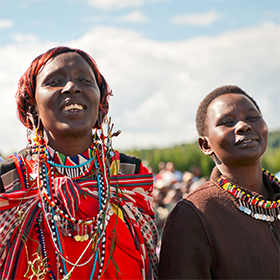
Last week, we featured an innovative participatory approach that uses technology to record land rights in Tanzania. This week, we have an example of an innovative participatory project design from Kenya.
In 2010, Kenya’s Constitution gave women new legal rights to own property. The Constitution also looked to traditional local leaders, such as elders and traditional authorities, to play a more formal role in dispute resolution. The Enhancing Customary Justice Systems in the Mau Forest, also known as the Kenya Justice project (KJP), brings these two threads together by teaching women, men, and children about the Constitution, women’s rights to property, and the role elders play in upholding these rights.
The project piloted a new approach for improving women’s access to justice, particularly related to women’s land rights, by concentrating on teaching male elders the importance of women’s access to justice and women’s land rights. This participatory approach was adapted with an aim to increase sensitivity to, and respect for, women’s land rights through traditional justice systems – such as dispute resolution systems governed by village elders. The project delivered legal literacy trainings to – and facilitated dialogues with – chiefs, elders, women, and youth. An impact evaluation found that the pilot led to increased legal awareness, particularly women’s legal knowledge and men’s knowledge of women’s rights, as well as women’s familiarity with the local justice system and alternative dispute resolution. Further, the project led to an increase in women’s confidence in both the fairness and outcomes of the local justice system, respect for women’s rights by men in the community, an increase in women’s access to land, and most notably, the election of several women to elder positions, for the first time in the Maasai and Kalenjin communities.
Following the inital success, additional funding was allocated in 2014 to produce an implementation guide to make the model replicable across Kenya. The improvement in women’s access to justice and land rights seen in the pilot community of Ol Pusimoru could be spread throughout Kenya through the broader implementation of the project model.
Check back next week to learn how USAID is using participatory approaches to influence attitudes and behaviors around women’s land rights in Kosovo.

